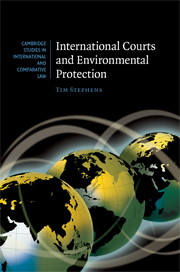Book contents
- Frontmatter
- Contents
- Foreword
- Acknowledgements
- List of tables
- List of figures
- List of abbreviations
- Table of cases
- Table of treaties and other international instruments
- CAMBRIDGE STUDIES IN INTERNATIONAL AND COMPARATIVE LAW
- 1 Introduction
- Part I International courts and environmental governance
- Part II Judicial development
- 5 Transboundary environmental damage
- 6 Freshwater resources and ecosystems
- 7 Marine wildlife and ecosystems
- Part III Contemporary challenges
- Bibliography
- Index
6 - Freshwater resources and ecosystems
from Part II - Judicial development
Published online by Cambridge University Press: 21 August 2009
- Frontmatter
- Contents
- Foreword
- Acknowledgements
- List of tables
- List of figures
- List of abbreviations
- Table of cases
- Table of treaties and other international instruments
- CAMBRIDGE STUDIES IN INTERNATIONAL AND COMPARATIVE LAW
- 1 Introduction
- Part I International courts and environmental governance
- Part II Judicial development
- 5 Transboundary environmental damage
- 6 Freshwater resources and ecosystems
- 7 Marine wildlife and ecosystems
- Part III Contemporary challenges
- Bibliography
- Index
Summary
The overuse and pollution of water basins throughout the world has caused severe environmental damage and resulted in worsening crises of water scarcity. As the world's population increases the per capita share of freshwater diminishes, and around 33 per cent of the world's population experience moderate to high water stress. Reversing the decline of freshwater ecosystems and addressing the challenge of scarcity requires a high level of international cooperation, as around one-third of the world's river basins are shared by two or more riparian states. In this context international environmental law has a role to play in addressing water security, improving water quality, maintaining freshwater ecosystems, promoting cooperative management, and preventing conflict through the peaceful settlement of disputes. This chapter considers the specific and important contribution that arbitral awards and judicial decisions have made to this field of international environmental law. It is seen that although this case law has traditionally been concerned with the equitable utilisation of freshwater resources, more recent decisions suggest an important (though far from complete) movement towards an ecologically oriented jurisprudence.
Jurisprudence
Relatively few disputes concerning international watercourses have to date proceeded to adjudication, with riparian states instead preferring diplomatic methods of settlement, often through joint river commissions. Indeed there has been significant debate as to the utility of adjudication in dealing with watercourse disputes.
- Type
- Chapter
- Information
- International Courts and Environmental Protection , pp. 163 - 195Publisher: Cambridge University PressPrint publication year: 2009

